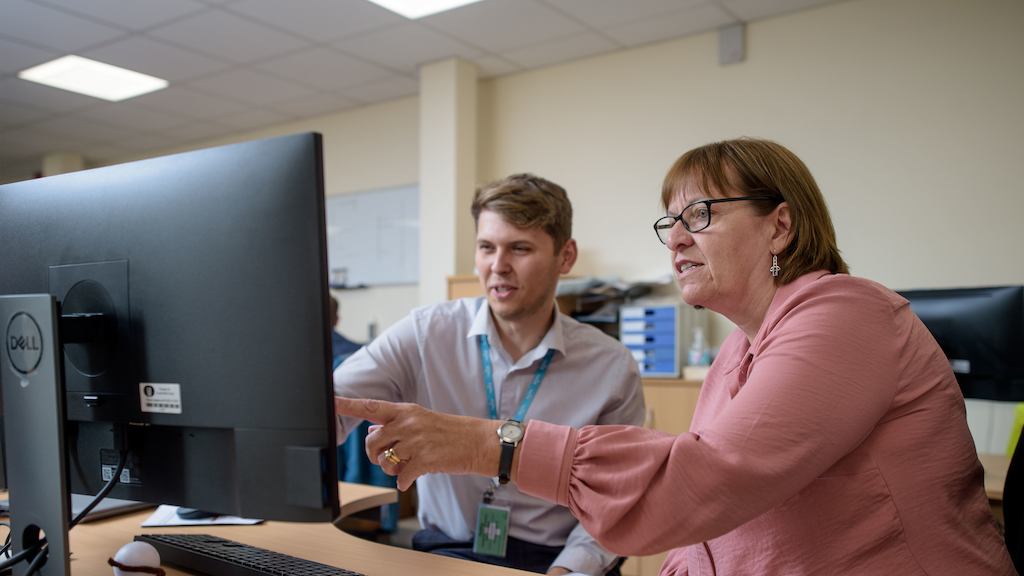How to use apprenticeships to unlock the potential of older workers

This case study from ISS, a leading workplace experience and facility management company, highlights how strategic use of apprenticeships can improve career development opportunities for older workers, while simultaneously strengthening business performance and inclusivity.
Top tips:
- Reframe apprenticeships as lifelong learning opportunities, not just entry-level routes for the young
- Showcase relatable role models who have thrived through later-life training
- Provide practical support to ease the transition back into learning
The challenge
Despite operating in a sector with a significant number of older employees, ISS noticed that staff aged 55 and over were underrepresented in its apprenticeship programmes. While the company has a substantial apprenticeship levy – owing to the size of its workforce – it found that uptake by older workers lagged behind that of younger employees, despite a clear appetite for progression and development.
As Sophie Goodlass, Talent Programme Consultant at ISS, explains:
There was a big stigma generally around the term ‘apprenticeship’ – many people still associated it with 16 to 18-year-olds making tea and doing filing. We needed to break that misconception, especially for our experienced employees.
The approach
ISS set out to tackle the stigma around apprenticeships and position them as career-enhancing opportunities for employees of all ages. It began by delivering a programme of myth-busting webinars, internal campaigns and storytelling initiatives. A key tactic was to present apprenticeships in terms people could relate to – talking about gaining qualifications, funding and career development – rather than leading with the ‘apprenticeship’ label itself.
While some companies might have avoided using the term altogether, ISS made a conscious decision to stand by it. “Apprenticeships aren’t going anywhere,” says Sophie. “We wanted to challenge the assumptions, not rename the programme.”
A cornerstone of the strategy was sharing real-life case studies. One such example is Jaswinder Disange, a supervisor at University Hospital Coventry & Warwickshire, who enrolled in a Level 3 Team Leader apprenticeship in his late fifties. Initially sceptical, Jaswinder admits he thought apprenticeships were “for 16-17 year-olds.” But after joining, he quickly saw the value.
“Learning can often be a tick-box exercise,” he says, “but this really made me step back and think about the impact I have on the business. I’ve changed how I structure and organise my team – and the results have been fantastic.”
The results
Although people aged 55 or over are still a small proportion of all ISS apprentices, they are represented across a wide range of disciplines – including data analysis, leadership and management, HR, security and engineering. Seven older workers are enrolled in the company’s new data apprenticeships, a key area for ISS’s future strategy. Others are taking part in the Women in Leadership programme, designed to elevate female talent across all age groups.
To support the unique needs of older learners, ISS has taken several practical steps:
- Community building: A private internal platform has been created for current and past apprentices to share knowledge, network and collaborate.
- Guidance tools: Resources such as ‘balancing work and study’ guides and explanations of the End Point Assessment (EPA) process help reduce anxiety, particularly for those returning to education after many years.
- Flexible delivery: ISS works with over 16 carefully selected training providers who adapt materials and teaching methods to accommodate different learning styles and life commitments.
As Sophie notes, one key breakthrough has been helping older workers feel confident about re-entering a learning environment:
There’s always a fear factor: life is different when you're older. You might be juggling family, work and health. So we’ve made sure the support is there to make it manageable and meaningful.
The wider business is seeing the benefits too. According to Jaswinder, the apprenticeship programme has had a transformative effect not just on him, but on his entire team: “We’re working more cohesively, hitting targets and getting positive client feedback. It’s actually made my job easier.”
By challenging assumptions and providing tailored support, ISS is proving that apprenticeships can be a powerful tool for lifelong learning, helping older employees thrive and businesses flourish. And signing the Age-friendly Employer Pledge has been valuable, ISS says, to make it feel accountable for sticking to the age-inclusive elements of its diversity and inclusivity strategy.
What can I do next?
- Audit your apprenticeship programme to understand who is taking part by age group
- Address stigma directly through myth-busting campaigns and inclusive messaging
- Promote relatable stories from older learners to inspire confidence
- Offer community support and practical tools to ease the return to study
- Consider apprenticeships as a route to meet wider business priorities, like digital transformation and leadership diversity



